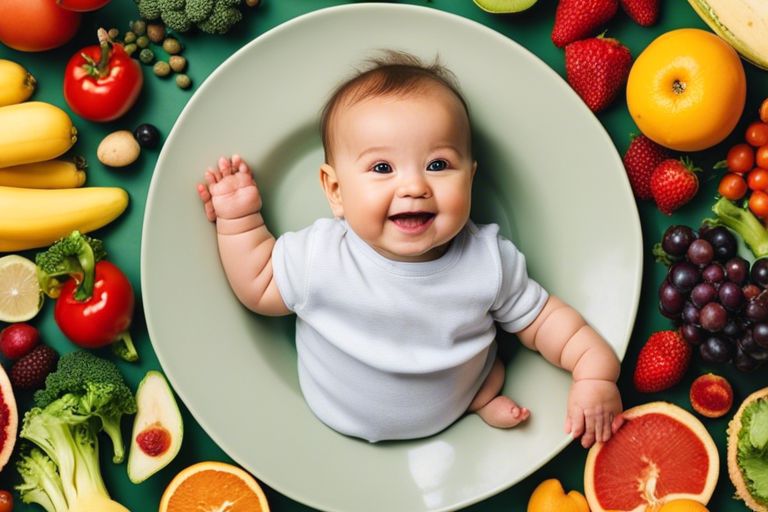tips, tricks and guides for parenthood
Most parents are eager to introduce solid foods to their little ones through a baby-led weaning approach, allowing babies to feed themselves from the start. While this method encourages self-feeding and independence, it is crucial to pay attention to nutritional adequacy to ensure the healthy growth and development of the baby. By offering a variety of nutrient-dense foods, monitoring iron intake, and being mindful of potential choking hazards, parents can successfully navigate the world of baby-led weaning whilst prioritising their baby's nutritional needs.

Clearly, with baby-led weaning, it's vital to grasp your little one's nutritional requirements. Babies at this stage need a variety of nutrients for growth and development. Understanding these needs will help you design meals that support their health and well-being.
With an effective meal plan, you can ensure your baby receives a wide range of necessary nutrients. Focus on offering a variety of foods, including fruits, vegetables, lean proteins, and whole grains to promote healthy eating habits from an early age.
Plus, remember to introduce allergenic foods one at a time and wait a few days before offering a new food to monitor for any adverse reactions. By following a balanced meal plan, you can lay the foundation for a lifetime of healthy eating habits.
If you're launching on a baby-led weaning journey, safety is paramount when selecting foods for your little one. Opt for nutrient-dense options like soft fruits, vegetables, and well-cooked grains to ensure your baby gets the imperative vitamins and minerals for healthy development. Avoid foods that pose a choking hazard, like whole nuts, seeds, and chunks of hard fruits or vegetables.
An important aspect of baby-led weaning is ensuring that the food you offer is prepared and served safely. Always wash fruits and vegetables thoroughly, cut them into manageable sizes, and cook them until they are soft enough for your baby to gum or chew easily. Remember to avoid adding salt, sugar, or excessive spices to your baby's meals.
Plus, it's crucial to practice good hygiene when preparing your baby's food. Wash your hands thoroughly before handling any food, and make sure all utensils and surfaces are clean to prevent the risk of contamination. Never leave your baby unattended while they are eating to minimise any potential choking hazards.
All Baby-led weaning: what a systematic review of the ...
For parents starting baby-led weaning, it is common to have concerns about potential choking hazards or nutritional adequacy. It is important to remember that babies are developmentally ready to handle solid foods by around six months of age, and while gagging may occur, it is a natural reflex that helps prevent choking. To ensure safe mealtimes, always supervise your baby closely and offer appropriate foods that are suitable for their age and stage of development. If you have any concerns, seek guidance from a healthcare professional.
Approach baby-led weaning as a journey that evolves as your little one grows. As your baby becomes more skilled at self-feeding and ready to explore different textures and flavours, adapt the foods you offer accordingly. Start with easy-to-hold finger foods like steamed vegetables and soft fruits and progress to a variety of nutritious options such as grains, proteins, and dairy. Remember to offer a balanced diet that includes a mix of nutrient-dense foods to support your baby's growth and development.
With this in mind, it is clear that ensuring the nutritional adequacy of a baby-led weaning approach is achievable with careful planning and consideration. By offering a variety of nutrient-dense foods in appropriate textures and sizes, parents can support their baby's development and growth while encouraging self-feeding skills. It is important to monitor and adapt to individual needs, gradually introducing new foods and being patient with the process. With the right guidance and a focus on balanced nutrition, baby-led weaning can be a successful and enjoyable way to introduce solid foods to babies, setting the foundation for a healthy relationship with food in the future.
A: Baby-led weaning is a method of introducing solid foods to babies that allows them to feed themselves from the start, rather than being spoon-fed purées.
A: To ensure nutritional adequacy, offer a variety of nutrient-rich foods such as fruits, vegetables, whole grains, proteins, and healthy fats. Make sure the foods are soft, cut into manageable pieces, and easy for baby to grasp.
A: Baby-led weaning can typically begin around 6 months of age, when babies show signs of readiness such as sitting up unassisted, showing interest in food, and being able to bring objects to their mouth.
A: Avoid foods that are choking hazards, such as whole nuts, large chunks of food, hard foods like raw carrots, and foods with added salt or sugar. Honey should also be avoided before the age of 1 year.
A: Offer a relaxed and supportive eating environment, let your baby explore and experiment with different foods at their own pace, and be patient as they develop their feeding skills. Encourage self-feeding and allow your baby to decide how much they want to eat.